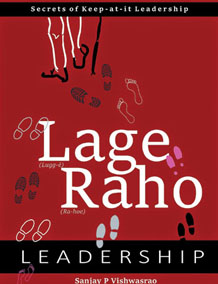Issue No.11 / July 16,2015

As a self-help book for the armed forces. It could work wonderfully as an army operations or military tactics textbook, even be included as mandatory reading for serving defence / army personnel, especially young officers.
Lage Raho by Sanjay P Vishwasrao, Colonel, Sena Medal & Bar, Indian Army, is a self-help book on Leadership, fauji style. Lage Raho (meaning ‘Keep at it, till it’s done well’) is a fictional account of a planned army operation in Jammu & Kashmir where a fictitious Rashtriya Rifles unit is tasked with the responsibility of neutralising terrorists and bringing about peace in the region.
Units have come and units have gone. The immediate period before this new officer takes charge has not been very successful, and what is left is a demoralised team. How the new leader takes charge, what methods he adopts to revitalise and re-enthuse the team, how they learn to take ownership of the task, take step by step measures in text-book fashion, get into the root of how the problem was hitherto tackled, formulate the strategy, chalk out the milestones, and implement the strategy to win the hearts of the J&K civilians, win their trust, and succeed in neutralising the terrorists is the narrative that stitches this lesson on leadership. It is an exposition of how the unit learnt to live and breathe the vision and mission, and ‘keep at it’ until they achieved their goal, applying the principles of team-leadership, but with a twist. The methods and principles used in this attempt are unconventional -- ‘servant leadership’, satyagraha (insistence of truth), ahimsa (cause no unnecessary or unjust injury), frugal and fearless means, to name a few.
By his own admission, as the author says on page 252 of the book, “This very book is a result of .....failed search for a practical self-help book on contemporary leadership.” As a self-help book for he armed forces. It could work wonderfully as an army operations or military tactics textbook, even be included as mandatory reading for serving defence / army personnel, especially young officers who have to lead their men in harsh and hostile situations. But whether it would be equally applicable to a business enterprise, big or small, or other institution outside the army, is debatable. At best, one can draw the essence of the tenets and principles and apply suitably. The second half of the book, spelling out theories, traits and skills of leadership has more relevant gyan for the lay leader.
| Book Name | Authors | Publishers | Price | Pages |
|---|---|---|---|---|
| Lage Raho Leadership | Sanjay P VishwasRao | APK Publisher | Rs.695 | 286 |
Although the book is well planned out, neatly organised in theme wise chapters, indexes, glossaries, references, full forms of abbreviations (which are so many), explanations for Indian language terms, military organisational terms, military planning and management terms, boxed off demarcations within each page, even a list of illustrations and graphics, and written in easy language, what jars is the excessive use of abbreviations. Maybe it is common in fauji communication, but the likes of MIH guys (Make it Happy guys), W5H of things ( what, when, where, why and how,. of things), SaAFFway (Satyagraha, ahimsa, frugality and fearlessness), OODA Loops (observe-orient- decide-act) -- to name a few – trip you up at every other sentence, making it a cumbersome and obstructive reading experience.
Another un-missable feature of this book -- the quotes. Initially every second page has three, four, five quotes gleaned from across the world – Sun Tzu to Colin Powell to Mahatma Gandhi to Kahlil Gibran to Winston Churchill to the Bhagwad Gita to Peter Drucker – many familiar, some obscure. Subsequently each page starts with a couple of quotes. If the book was not called Lage Raho, it could well be called the Book of Collected Quotes. It is unlikely you will find such a vast compilation of quotes anywhere else except in a book of quotes. Each quotation taken by itself is a gem loaded with wisdom. But when there are so many – Phew! That’s too much food for thought.
This is not a book you can breeze through. You need to read and re-read it in pieces, chew and mull. And later put into action as a leader, perhaps. Lage Raho! Keep at it!
By Usha somayaji